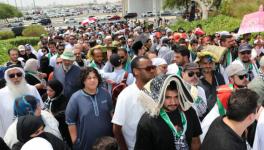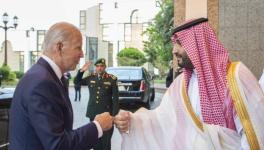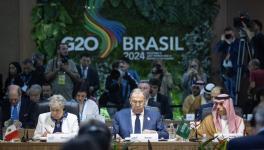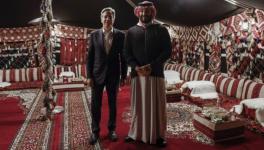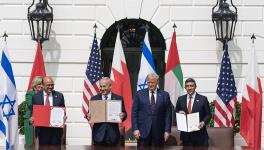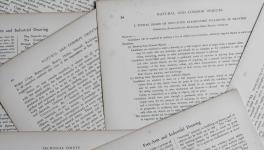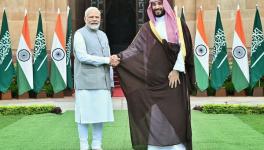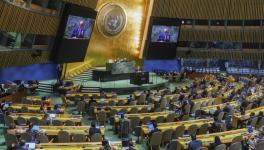Saudi Embrace of Qatar Falls Short of Gulf Unity
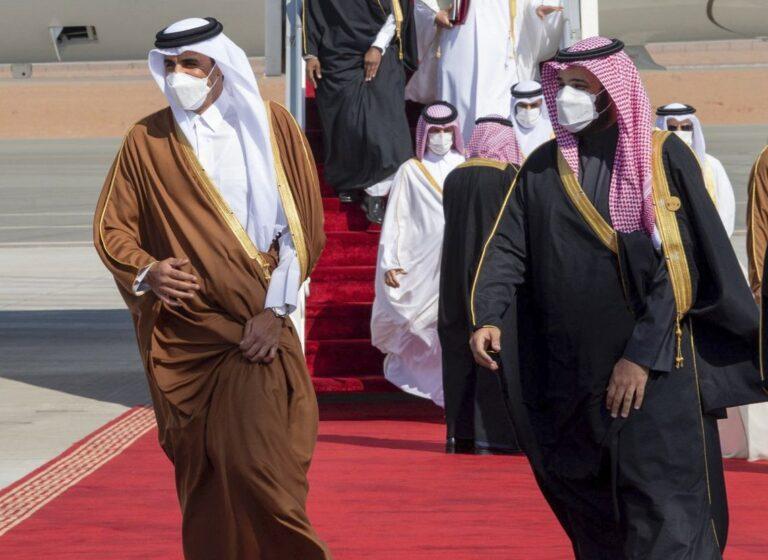
Saudi Arabia’s Crown Prince Mohammed bin Salman (R) welcomes Qatar’s Emir Sheikh Tamim bin Hamad al-Thani upon arrival to attend Gulf Cooperation Council Summit in Al-Ula, Jan. 5, 2021.
The West Asian region is such a fragmented part of the world that any semblance of reconciliation on any of the criss-crossing fault lines becomes a matter for celebration. Unsurprisingly, the agreement on Tuesday to ease the rift between Saudi Arabia and Qatar has won acclaim from far and wide in the region and the world at large. It has been hailed as a breakthrough.
However, a sense of disquiet remains. What really happened on Tuesday is unclear yet. The communique contained only a general pledge of solidarity and there is no detailed confirmation of a deal as such for mending the rift between Saudi Arabia, the UAE, Egypt and Bahrain on the one side and Qatar on the other side.
From available details, the deal has three elements: one, the end of the blocking of air, land and sea routes connecting Qatar with Saudi Arabia; two, Doha dropping legal actions it had initiated over the embargo, notably over limitations on air transit; and, three, both sides will stop media campaigns against the other.
The veteran regional expert Simon Henderson at the Washington Institute for Near East Policy aptly summed up: “This being the Middle East, the wording must be cautious and it’s wise to include a “probably” or “perhaps” somewhere. But there is no doubting the potential significance of the news. An often absurd tiff between Washington’s allies has been taken off the front burner. The significance is arguably bigger than Israel’s recent “normalisation” agreements [Abraham Accords] with the UAE and Bahrain… [But] this is a moving story and answers to “What does it all mean?” questions will need to wait, literally, until the desert dust settles.”
The Saudi Foreign Minister Faisal bin Farhan al-Saud told a news conference, “There is political will and good faith” to guarantee implementation of the deal, and claimed that the UAE, Bahrain and Egypt had also agreed to restore ties with Doha. But UAE Minister of State for Foreign Affairs Anwar Gargash sounded cautious, saying “we need to be realistic about the need to restore confidence and cohesion”. He later said there was a timeline for ending the conflict, but gave no details.
Even the usually ebullient US secretary of state Mike Pompeo, while welcoming what he called a “breakthrough to restore Gulf and Arab unity,” added: “We hope the Gulf countries will continue to reconcile their differences. Restoring full diplomatic relations is imperative for all parties in the region to unite against common threats.” Kuwait said Saudi Arabia would reopen its air space and borders to Qatar, but the other three Arab nations are yet to announce similar moves.
The mother of all surprises is that Qatar has not fulfilled any of the famous 13 demands its neighbours had boastfully made three and a half years ago while imposing embargo and breaking off diplomatic ties with Qatar, including closing Al Jazeera TV, shuttering a Turkish base, cutting links to the Muslim Brotherhood and downgrading ties with Iran.
Indeed, the detente seems borne more out of exhaustion than compromise. What explains this exhaustion? The short answer is that Saudis and Emiratis, in sheer arrogance, empowered by President Trump, bit more than they could chew. The two crown princes had assumed that their recalcitrant neighbour, the smallest of the Gulf states, could be brought to heel easily. (At one point, they even had a plan to invade Qatar.)
But things didn’t work out that way. Qatar simply dug in. Turkey and Iran came to its aid to withstand the embargo. And, eventually, Qatar turned the table back on the Saudis and Emiratis by forming an axis with Turkey and the remnants of Egypt’s Muslim Brotherhood, in exile in Turkey, up against Prince Mohammed in Riyadh, Mohammed bin Zayed in Abu Dhabi and Egyptian leader, Abdel Fatah al-Sisi.
Meanwhile, Turkey and Saudi Arabia faced off in the aftermath of the murder of Jamal Khashoggi in October 2018, carried out in Istanbul by Saudi royal court aides, which severely damaged the reputation of crown prince Mohammed bin Salman.
An inflection point came, finally, when Trump lost the election in November. The Saudi-Emirati fear is that president-elect Joe Biden will take a softer line on an even bigger foe than Qatar — Iran. Besides, Biden has vowed to come down heavily on Saudi Arabia to force changes in its behaviour and end the brutal war in Yemen.
Through this deal with Qatar, Saudis hope to signal to Biden that Riyadh is open to the path of dialogue. By such signalling, the Saudis hope to preempt pressure from the incoming Biden administration.
As for Qatar, it is preparing to hold the 2022 football World Cup and could do without further headaches with its bullying neighbours, and also benefit from a diplomatic reset. Qatar’s only precondition for a rapprochement has been that it not be seen to be cowed into concessions.
At the end of the day, nothing is forgotten, nothing is forgiven. The Qatari wounds remain raw and the detente can only paper over a faultline that had deepened through the past three years. Simply put, what happened to Qatar should not have happened to any country.
How can Qatar easily forgive and forget that the UAE’s First Abu Dhabi Bank, Saudi Arabia’s Samba Bank and Luxembourg-based Banque Havilland (acting on behalf of one of its largest clients, Mohammed bin Zayed, the crown prince of Abu Dhabi and de facto ruler of the UAE) sought to sow economic instability by undermining confidence in Qatar’s currency and bonds, staged a coordinated attack to deplete Qatar’s foreign-exchange reserves and tried to weaken the Qatari riyal by “submitting fraudulent quotes to foreign exchange platforms based in New York, to manipulate New York-based indices, and disrupt financial markets in New York, where significant Qatari assets are held and many investors in Qatar are located”?
How can it forget that weeks before the blockade was imposed, Qatar’s state media agency was hacked and false stories attributed to the Emir Sheikh Tamim bin Hamad Al Thani were published on its website? In 2020 alone, at least 36 Al Jazeera journalists were targeted by advanced spyware sold by an Israeli firm in an attack linked to the governments of Saudi Arabia and the UAE, cybersecurity watchdog Citizen Lab reported.
Numerous reports by the UN as well as human rights groups show that the Saudi-Emirati blockade deliberately targeted Qatari families in cases where members hold different citizenship, and forcibly separated them. Shall we call it “motiveless malignity”?
Furthermore, the perennial threat that the two crown princes in Saudi Arabia and the UAE were casting the evil eye on its fabulous wealth forced Qatar into one of the most ambitious armament programmes in modern times, costing dozens of billions of dollars to defend itself. In three years flat since the Saudi-UAE hostility erupted in 2017, Qatar, which had no air force worth mentioning, has acquired around 100 fighter jets — and more are on the way — from France, UK and the US; it has acquired Bayraktar TB2 drones drones from Turkey, Leopard 2A7 battle tanks from Germany, self-propelled artillery from Germany and short-range ballistic missiles from China, corvettes and submarines from Italy — and has shown interest in Russia’s S-400 anti-missile defence system.
An Al Jazeera report noted that in three years, “every branch of its military has increased in size by orders of magnitude, their firepower and training moving at a great pace. Qatar has grown into a powerful regional force, with allies both in and beyond the region.” The point is, Qatar suspected, rightly so, that the real motivation on the part of the two crown princes in the neighbourhood was to annex Qatar which has the world’s largest gas reserves second only Russia’s.
No, there’s no way the absence of the rift with Qatar can mean “Gulf unity” –simply because two crown princes in the neighbourhood desire so in an abrupt change of tack — prompted by Trump who is pushing for one more last photo-up in the Arabian desert.
Nor is this detente going to significantly affect geopolitical dynamics in the region. Looking ahead, everything depends on real change in the Saudi and Emirati behaviour and policies. Of that, there are no signs as yet.
Get the latest reports & analysis with people's perspective on Protests, movements & deep analytical videos, discussions of the current affairs in your Telegram app. Subscribe to NewsClick's Telegram channel & get Real-Time updates on stories, as they get published on our website.









